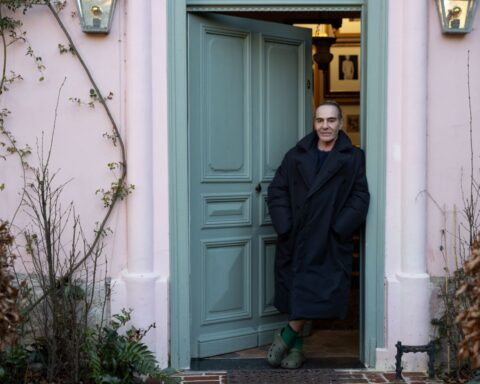As Eastern Europe suffered a deadly deep freeze in February, which caused fatalities in Ukraine and Poland, Berlin succumbed to some of the lowest winter temperatures in years. Not exactly the most welcoming weather for one of the world’s biggest film festivals. But Berliners, and anyone who has been here before, is used to the gloom that accompanies the galas.
The 62nd International Berlin Film Festival is an icy opus that showcases the globe’s top cinema, from studio starlets at the galas to experimental explorations, courtesy of the Forum, the self-proclaimed ‘daring’ section that showcases the avant-garde. As the advance guard to the illustrious Cannes Film Festival in peak spring, the Berlinale has become over the past decade a cosmopolitan cultural hub. This year brought the likes of Jake Gyllenhaal, who served on the international jury; Angelina Jolie, who premiered her directorial debut, In the Land of Milk and Honey; and Meryl Streep, who received an Honorary Golden Bear for Lifetime Achievement in cinema.
Canadian film also had something to celebrate with War Witch, which screened in competition, making Kim Nguyen the first Canadian filmmaker in 13 years to have a film in this category. Adding to the occasion, actress Rachel Mwanza took home the Silver Bear for best actress. The last Canadian director to have a film in competition at Berlin was Léa Pool, with Emporte-moi in 1999. Bona fide Berlinale(er) Guy Maddin screened Keyhole in the Special section; it’s another surrealist installment that frames his phantoms of perversion against silent movie motifs of black-and-white tableaux.
But what about documentary cinema? Where can this prevailing genre fit in amongst the giants of the Entertainment Industrial Complex? For its size and reputation, the Berlinale has never managed to curate a separate cohesive section for the genre, which leaves those who frequent the format left scratching our heads. Instead, documentaries in Berlin are slotted into the Panorama section, under Panorama Dokumente, and the Forum, where their elusive curatorial descriptions make it difficult to distinguish them from fiction, and thus, fall under the radar.
Panorama Dokumente
Panorama Dokumente does dish out a healthy serving of nonfiction programming, the majority being queer contenders for the Teddy Awards, the international prize for films with LGBT (lesbian, gay, bisexual, transgendered) topics. This year, Call Me Kuchu, by Malika Zouhali-Worrall and Katherine Fairfax Wright, won the Teddy for Best Documentary Film. It also garnered second place for the Panorama Dokumente Audience Award; first prize went to Matthew Akers’ Marina Abramovic: The Artist is Present, which follows the work of the “mother of performance art.”
As strong documentaries should do more often, a number of selections in the Panorama Dokumente section offered topical subjects currently dominating the headlines. Just as Uganda’s anti-homosexuality bill has been resurrected, Call Me Kuchu screened to packed and obviously moved audiences. First introduced in 2009, the bill called for the imprisonment of homosexuals and in severe cases even the death penalty. In a country where 95 percent of the population condone the criminalization of homosexuality, a group of queer activists has been fighting to prevent this legislative proposal from going ahead, risking their lives in the face of public threats, the church and corrupt authorities.
Call Me Kuchu describes the life of David Kato, Uganda’s first openly gay activist, along with his kuchus—as the LGBT community is called—and his comrades-in-arms including Bishop Christopher Senyonjo, the only cleric to position himself on the side of the persecuted gay community. While filming, the directors became quite close to Kato until he was found bludgeoned to death in his bed, one year ago. His murder ignited an international outcry for Ugandans to stop the hate against homosexuals.
As a film, the least Call Me Kuchu can do is encourage other media to examine the potential of the anti-homosexuality bill—a frighteningly real prospect that Ugandans will be imprisoned for their sexual orientation and possibly killed. It’s a nearly flawless work that measures the temperature of hate on the part of church and state against the survival tactics of the LGBT community.
Words of Witness by Mai Iskander is a story about the Egyptian revolution told from the perspective of a young committed journalist. A few months before Mubarak’s resignation, Heba Afify began working for the English-language edition of an independent Egyptian daily called Al-Masry Al-Youm. As an adept 22-year-old, Afify is determined to be the newfound voice of the people, as she navigates the protest circles of Tahrir Square with a small spiral notebook and pink pen, against the pleas of her mother who begs her to leave the uprising to the males and older women. “You’re not a journalist, you’re a girl,” she lectures, believing that even the modern Egyptian woman must be kept safe.
Scouring the abandoned State Security office for clues to reporting on a clash between Christians and Muslims over a burned church, Heba’s brave communion with the people of Cairo provides a direct link for Mai Iskander. Words of Witness captures an Egypt still fraught with protests, demonstrating the plight of the people who are skeptical of the army’s promise of protection and the restoration of democracy.
Berlinale Special
While Panorama Dokumente screened works from newly discovered documentarians at the cross-section of art and commerce, the Berlinale Special showcased a few high-profile docs from auteurs. Likely the most arduous to endure for its whopping 188-minute running time was Werner Herzog’s Death Row. The name says it all, coming from the Prince of Doom. Balancing Herzogian themes, the director’s portrait of four murderers is incredibly captivating through its ability to disclose secrets from the depths of the human soul, crowning Werner Herzog once again the master of the interview.
Herzog has built a 50-year career by looking in the right places to extract the best stories from lineup after lineup of unsavory characters. Most of the time, he manages to hit all the proper emotional notes. Though their tales are macabre, the killers are human beings in Herzog’s eyes; he leaves the monster-making to the sensationalists. Produced originally for the Investigation Discovery channel in the United States, each portrait begins with a point-of-view shot that lumbers down a sickly hallway, creeping loser to the lethal injection room as the harrowing strings swell. Herzog’s voice-over explains that the death penalty is legal in 34 states, but only 16 actually perform executions. “As a German, coming from a different historical background, and as a guest in the United States,” says Herzog, “I respectfully disagree with the practice of capital punishment.”
In interviews with the prisoners shown between the gruesome details of the murders, Herzog evokes answers that get to how life is lived ephemerally on Death Row. How often do you see the sun? Hear the birds? What do you dream about? “Avocado, tequila and washing machines,” answers Hank Skinner, who is awaiting execution for a triple homicide for which he pleads innocent. What do you wish for? “To jump in the ocean and clean off all the filth,” answers James Burns, a convicted serial killer from Florida.
On a lighter theme, Academy Award–winning U.K. director Kevin Macdonald (Touching the Void, One Day in September) had his world premiere of Marley, a biopic of the Rastafarian singer that charmed audience members of all ages and nations at Berlin’s opulent Friedrichspalast theatre.
Neville Garrick, an original member of the Wailers, came on stage with the director to say a few tender words on behalf of one of the world’s most celebrated artists. Rohan Marley, one of Bob’s 12 children, was also in attendance to give a warm Rastafarian greeting. Later, during the press conference, Macdonald noted, “Bob is one of the greatest cultural figures of the 20th century. I don’t think anyone in popular music has had the same lasting impact as he has. Anywhere you go in the world, you find Marley’s image, his music, his wisdom.” It was evident after the premiere, when the crowd wiped the tears from their smiling faces as the credits rolled.
As Bob Marley sang for peace and freedom in the world, so does prolific Chinese artist Ai Weiwei offer a voice for his own people… of course, employing the ‘F’ word much more often. Always subversive and never apologetic, Ai has been the most provocative and outspoken individual in the isolated and repressed society of contemporary China. In Alison Klayman’s Ai Weiwei: Never Sorry, the first-time director gained unprecedented access to Ai while working as a journalist in China. The result is a condensed version of two years of the artist’s work and rebellion, witnessing some of the gutsiest actions ever taken by an artist in a nation that uses severe censorship as a constant political tactic.
Ai disappeared at the hands of Chinese authorities last year and was released three months later. Since then, he has been forbidden to discuss his case and has lost all rights to express himself freely through social-media tools, for which he is a stark advocate. He is also prohibited from leaving Beijing without permission for one year.
As a result, his following has been forced to keep his voice alive online, re-tweeting his slogans and calls to action. To pack a little extra punch, Klayman’s team offered fortune cookies to the audience members after each Berlinale screening. The wisdom inside the sweet treat were proactive proverbs from Ai himself: “Words may be deleted, but the facts won’t be deleted with them,” for instance.
Focus Forward
How can we help documentary filmmakers? That is the central question of Focus Forward—Short Films, Big Ideas, the co-initiative between CINELAN and General Electric. The effort, led by CINELAN co-founders Morgan Spurlock and Karol Martesko-Fenster, has called upon 30 award-winning filmmakers to create three-minute docs on subjects that address the human power of innovation. Filmmakers involved in the initiative include Gary Hustwit, Katy Chevigny, Lucy Walker, Barbara Kopple, Steve James and Alex Gibney, among many others. Over the next six months, the Focus Forward films will debut online and at major film festivals around the globe.
During the Berlinale Talent Campus, the festival’s six-day creative summit for upand-coming filmmakers, CINELAN’s Damon Smith, along with Focus Forward filmmakers including Academy Award–winner Jessica Yu, were present to discuss the series and to unveil the first five films from the partnership, which had their premiere at Sundance last January. Impressive though they were, some audience members shared their suspicions concerning how much pull GE has when it comes to content. What interest does General Electric have in funding documentary filmmaking? The answer is: a mix of goodwill and hip image making. As it stands, Focus Forward directors have full creative rein once, of course, GE approves their proposals. The initiative is one of licensing films, not commissioning them.
During the Talent Campus presentation, moderated by Sean Farnel, five films were screened, including Heart Stop Beating, by Jeremiah Zagar, about two visionary doctors from the Texas Heart Institute who successfully replaced a dying man’s heart with a ‘continuous flow’ device, and the humorous Meet Mr. Toilet, by Jessica Yu, about businessman-turned-sanitation-superhero Jack Sim.
Though three minutes seems almost an arbitrary runtime (why not five to give the story a little more depth?), Damon Smith explained that CINELAN is confident that a few minutes is a sufficient amount of time to engage audiences who wouldn’t normally watch docs. It should be looked at as more of an appetizer to the genre, rather than the main course. And as for the documentary programming at the Berlinale, it appears we’re still waiting for it.











